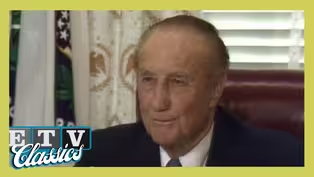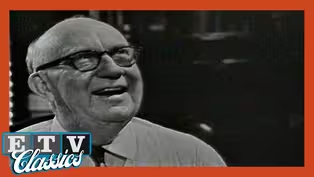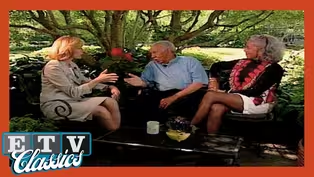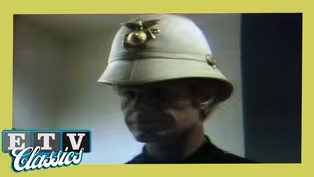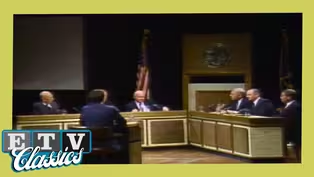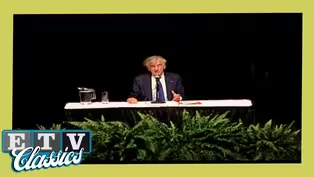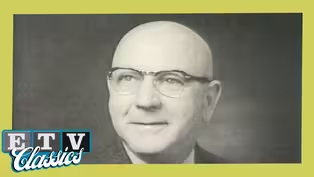ETV Classics
Profile: Senator John Drummond of Ninety-Six | The Big Picture (2008)
Season 15 Episode 15 | 26m 53sVideo has Closed Captions
The life and times of Senator John Drummond of Greenwood, South Carolina.
This episode of The Big Picture chronicles the life and times of Senator John Drummond of Greenwood, South Carolina. We find our host, Mark Quinn, inside the chamber of the South Carolina State Senate as he begins his profile of the political career of this master statesman.
Problems playing video? | Closed Captioning Feedback
Problems playing video? | Closed Captioning Feedback
ETV Classics is a local public television program presented by SCETV
Support for this program is provided by The ETV Endowment of South Carolina.
ETV Classics
Profile: Senator John Drummond of Ninety-Six | The Big Picture (2008)
Season 15 Episode 15 | 26m 53sVideo has Closed Captions
This episode of The Big Picture chronicles the life and times of Senator John Drummond of Greenwood, South Carolina. We find our host, Mark Quinn, inside the chamber of the South Carolina State Senate as he begins his profile of the political career of this master statesman.
Problems playing video? | Closed Captioning Feedback
How to Watch ETV Classics
ETV Classics is available to stream on pbs.org and the free PBS App, available on iPhone, Apple TV, Android TV, Android smartphones, Amazon Fire TV, Amazon Fire Tablet, Roku, Samsung Smart TV, and Vizio.
Providing Support for PBS.org
Learn Moreabout PBS online sponsorshipMore from This Collection
Open Line: Carolina to Shanxi (1980)
Video has Closed Captions
An exchange program for higher education between USC and the people of China's Shanxi Province. (28m 51s)
Charleston Place | Carolina Journal (1986)
Video has Closed Captions
This edition of "Carolina Journal" revisits the opening of the Charleston Place complex. (27m 20s)
U.S.S. South Carolina | Carolina Journal (1984)
Video has Closed Captions
Michael Collins goes aboard the missile cruiser U.S.S. South Carolina as it visits its namesake. (28m 54s)
Strom Thurmond Remembered (2003)
Video has Closed Captions
Charles Bierbauer reviews the life and accomplishments of South Carolina Senator Strom Thurmond. (1h 51m 22s)
Strom Thurmond At The Seat of Power (1982)
Video has Closed Captions
The documentary follows the life and career of Strom Thurmond. (29m 49s)
Profile: The Senator from Barnwell: Edgar A. Brown (1967)
Video has Closed Captions
A visit with the venerable Edgar A. Brown in his law office, home, and the streets of his hometown. (14m 42s)
A Conversation with Justice Ernest Finney, Jr.: A Lifetime of Success (2000)
Video has Closed Captions
The honorable Judge Ernest A. Finney, Jr. discusses his life, career, and legacy in SC's lawfare. (27m 47s)
Video has Closed Captions
The memoirs of three businessmen who attribute their successes to their time in the US Marine Corps. (28m 54s)
The Governors' Roundtable | Carolina Journal (1989)
Video has Closed Captions
A round-table discussion with nine men who served as governor of the state of South Carolina. (57m 54s)
Elie Wiesel | Solomon Tenenbaum Lectureship in Jewish Studies (2006)
Video has Closed Captions
Professor Elie Wiesel, first Nobel laureate delivers a lecture as a part of the Tenenbaum series. (1h 17m 18s)
Solomon Blatt: Speaker Emeritus of the SC House | Carolina Journal (1985)
Video has Closed Captions
The life and career of Solomon Blatt, Speaker Emeritus of the S.C. House of Representatives. (27m 49s)
Remembering Bill Moyers: War in the Gulf - Town Meeting (1991)
Video has Closed Captions
Bill Moyers, who died June 26, 2025, was an award-winning journalist and PBS host. (59m 32s)
Providing Support for PBS.org
Learn Moreabout PBS online sponsorship♪ Mark Quinn> This week, The Big Picture profiles the distinguished life of State Senator John Drummond.
Philip> In his early days in the Senate, he was something of a rebel.
Mark> War hero and political maverick, two labels we'll hear more about tonight on The Big Picture .
Hello, and welcome in to The Big Picture, I'm Mark Quinn.
We begin tonight's program inside the chambers of the South Carolina State Senate.
We do so to profile the political career of John Drummond from Greenwood.
Here's a man who spent much of his life dedicated to public service.
A decorated war veteran who spent time in a German prison camp.
After the war, he came back stateside, essentially to serve the people of the state of South Carolina.
Tonight we profile the life and times of Senator John Drummond.
♪ Sen. Sanders> John Drummond has been a war hero and a prisoner of war.
He's been a cotton mill worker and a doughnut baker.
He's been a political maverick and a peacemaker.
He's been an upstart and a statesman and all along the way, he's been a proud South Carolinian.
Hello, I'm Alex Sanders.
At the age of 88, John Drummond leaves the South Carolina General Assembly as its longest serving member.
He has held positions of highest power in the Senate.
He's championed cooperation rather than confrontation.
He's crossed party lines in his support for candidates and issues.
He's been called a "senator's senator."
As he goes back home at the end of the session, he will always be the "Senator from Ninety Six."
♪ John Willie Drummond was born to the life of the cotton mill, not to the floor of the State Senate.
He grew up in a time when the only future ahead of him was to work in the mill, raise a family, and hope his children would have a better life.
> But I worked in the textile mill in the town of Ninety Six, and the whole family, and we had small towns in South Carolina, mostly agricultural.
It was either agriculture or textile.
Sen. Sanders> Not long after graduating from high school, Drummond joined the South Carolina Coast Artillery Regiment and was stationed in Charleston.
In 1941, events a half a world away would change his life forever.
Sen. Drummond> Sunday morning on December 7th, I was in the National Guard- I was in the federal service then in Charleston, in tents out on Fort Moultrie, the officers- after parade on Saturday, the National Guard officers go home.
Sometimes they'd let us go.
But that weekend, I was staying over.
I was a Sergeant.
Sunday morning, I don't know what time, here comes- We had a little radio.
It was about the only thing we had.
We didn't have television.
Somebody was listening to them, I really, truly I don't think we were listening.
We were probably playing poker or something, some real cheap poker, passing the time that morning.
And someone came down the street between the two tents and said, "The Japanese have attacked Pearl Harbor."
The reason I vividly remember is someone said, "Who is she?"
We didn't know Pearl Harbor.
Really and truly, I had no idea that Pearl Harbor existed.
But somebody really said, "Who is she?"
Sen. Sanders> Drummond, his five brothers, and one sister all joined various military branches.
He was especially interested in becoming a paratrooper.
He scored so well on his paratrooper's exam that the examiner suggested he take the test to become a pilot.
He did and entered the Army Air Corps pilot training program.
Sen. Drummond> The first day that I got that plane, I took off to Ninety Six and buzzed it.
You know what you call "buzzing."
And we had just had some orders from the Third Air Force that the next one caught buzzing, we'll wash 'em out.
Of course, we had just lost a couple of pilots to buzzing, and I think they had killed a- But I went to Ninety Six the first flight and buzzed my little town, really buzzed them, in a P-39.
They knew who I was.
I wanted them to know who I was.
I think most all fighter pilots want to do that.
Of course, I got reported, and the Colonel called me in and said, "Lieutenant, you've been reported that you're buzzing in your hometown.
Is that true?"
And I said, "No, sir."
I looked him square in the eye, saluted him, and said, "No, sir," 'cause I knew they would wash me out.
Sen. Sanders> By D-Day in 1944, he'd become Captain Drummond, a decorated veteran of 45 missions.
Flying his powerful P-47 named "Raid Hot Mama," he became a hero for helping a fellow pilot dislodge a partially released bomb.
He flew underneath the aircraft and knocked the bomb loose with his wingtip.
Drummond's luck changed the next day.
Barely two months after the invasion, he was shot down over German territory.
He spent the rest of the war in a prison camp.
When he returned to Ninety Six at the end of the war, he dated the girl he called "the love of his life," Holly Self.
They were married in 1947 and had three children.
Drummond and Miss Holly were married for 53 years, until her death in 1999.
One of the famous stories about Drummond and Miss Holly comes from their first date when he returned from the war.
He found he had competition from another veteran, who would also become a famous politician.
> There's a story that Senator Thurmond also dated Holly Self.
And she chose John Drummond to be her mate and then later her husband.
But he and the Senator stayed friends for years.
Holly Drummond would be his campaign manager in Greenwood County when he ran for the Senate.
So John Drummond was very comfortable dealing with Senator Thurmond.
When Carroll Campbell was a Congressman, he was very comfortable dealing with him, and later as governor for two terms.
Drummond was just as comfortable walking into Carroll Campbell's office as he would have been with John West or Dick Riley or Bob McNair.
A man that just not only talked the talk about nonpartisanship, but he walked that walk very, very comfortably too.
Sen. Sanders> Back home, Drummond did not return to the cotton mill.
He began a small business, a doughnut shop.
By the mid 1950s, he'd moved on to the oil business.
After ten years of building what became Drummond Oil Company, he turned his attention to politics.
> My first experience with Senator Drummond was in the chamber of commerce.
We were both members of the chamber of commerce, and they had a program that they called Action Course in Politics.
And they appointed a committee to study this, and Senator Drummond happened to be chairman of that committee, and I was interested in that type thing.
So we studied how to go about a political campaign.
And an interesting thing, we must have done a fairly good job because, either the next year or soon thereafter, I was elected Mayor, and he was elected to the House.
Sen. Sanders> The legendary House Speaker Sol Blatt singled out Drummond as one of his protégés.
As a powerful member of what was known as "The Barnwell Ring," Blatt's support of a house member was highly prized.
With the Speaker's endorsement, Drummond was elected to the State Senate in 1967.
> Drummond led a group that became known as the "Senate Renegades."
And it was a big, big revolt against the leadership over the budget, and it was both freshmen and the sophomores and some of the senior members, but there was Senator Drummond out there.
And I'll always remember that.
They used to kid him, as some people wrote about a "Senate six-pack," and it was because most of the Republicans that had been elected were new senators, and Drummond, but it wasn't that Senator Drummond was a Republican.
It was that Senator Drummond was willing to take on issues and to ask why aren't we doing it a different way.
And it's hard to explain to you unless you're in there and see him, but to watch him wrap around that podium, and when he got at that podium, an educational seminar was ahead.
And nothing was gonna get John Drummond down from that podium.
> John has repeatedly been reelected here.
And it's no accident.
John does his job, he looks after his constituents, and he comes across as the sincere person that he is.
> I think one of the things that he really, really thinks about and has thought about consistently through his career is that one should keep focused on the matters that are important to the state and to the public.
And these aren't, in his eyes, in his view, politically divided.
He says that there are differences in views, but they're not Republican, they're not Democrat, they're different views.
He just doesn't see colors.
He doesn't see the Democrat or the Republican or anything else.
> I think you'll find John Drummond, over the years, has been sometimes conservative and sometimes liberal in the way his voting patterns have evolved, and he defies any kind of labeling.
In his early days in the Senate, he was something of a rebel.
On occasion, he would vote with the Republican bloc at the time, which was all of six votes in the Senate.
And they used to call that the "six-pack and Drummond bloc" when he would vote with them.
But he's defied any kind of description for that reason.
He just refuses to be pigeonholed.
> The funny thing is he always used to tell me that he was gonna hold a seat for me.
He did.
And I thought about that for a while, and I think back on when he used to take me down there and I used to sit in my granddad's lap down there on the Senate floor.
And I used to look around and see all the people down there, and I used to go around- I had a funny name for it, I used to call it the "zoo."
My granddad was going to the zoo down there.
> He's an independent thinker, and he has been a Democrat all his life.
But when you come to Republican philosophy versus Democrat philosophy, he's a double-dip Republican in philosophy.
And he wants to do the right thing, the patriotic thing, the responsible thing, and he votes and works for people and laws that create that kind of thing in South Carolina.
> In the State Senate, what's the best interest of the state of South Carolina?
All groups, all of this talk that you hear in Washington about the middle class and the poor and the rich, about taxes and everything else, you think of the good of the state of South Carolina, and whatever was good for the state, John Drummond was for, and he fought for it, I can tell you that.
He didn't- that's what I like about him.
He's a fighter.
> Senator Drummond was a maverick and is a maverick.
I remember when he supported Strom Thurmond.
I remember when he supported Democrat candidates and when he supported Republicans.
He is for what he thinks is right.
And I guess that's the old fighter in him, the pilot, the fighter.
He's tough, now, I'm gonna tell you.
I've been on the opposite side, on the receiving end from him, and I've been there with him.
Most of the time, I'm with Senator Drummond.
And he always treats you with respect, but he's gonna fight you if he believes in what he believes in.
And you needn't think you're gonna sweet-talk him or anything.
Sen. Sanders> While Drummond loved the Senate, he loved his native Greenwood County more.
Back home, he supported institutions to serve the people of Greenwood.
He worked with local leaders to establish a center for the disabled, a groundbreaking genetics center, and a forum on politics at Erskine College.
> The thing that amazes me about Senator Drummond, and you look at him, and if you need something and he knows it's worthwhile to help people back in his community, he would do that.
I could call him any time, and he usually would return the call, and if we'd run into a problem, he'd try to help us out.
And he was elected chairman of Senate Finance several- I don't know what year, but it was a good many years ago, and I was driving home from Columbia, and he called me up on the phone, and he asked me "Would I love to speak to the chairman of the Senate Finance Committee?"
And I said, "Well, I sure would."
I said, "Put him on."
And he says, "He is on."
So, that was a thrill to me, and he wanted me to know that he'd be in a position to help us more, and he has.
> The whole thought of having to try to explain genetics and what we're doing in this field, trying to, particularly to move the field to where we're able to bring curative therapies to genetic disorders, the idea of how to explain that to everyone so they can understand it easily has been a bit of an overwhelming task.
And John Drummond is one of those folks who has helped explain it over the years.
In very simple terms, in terms of doing something good for the people of this region, but good also for the state.
> The Drummond Center was set up as an organization- it's really being based at Erskine College.
And its purpose is to bring together potential political leaders in the future, whether it be city, county, high school seniors, high school students, bring them together and let them sit down and talk to experienced politicians and business leaders and try to find out exactly what they expect out of the jobs that they are aspiring to.
For example, if you're going to school board, why are you running for school board?
What's your purpose?
Are you mad at a teacher?
Are you running for that purpose?
There's got to be a better reason than that.
Sen. Sanders> Despite the power he held at the State House, Drummond understood that he'd come a long way from the mill in Ninety Six.
That understanding gave him a respect for his colleagues in the Senate, admiration for the institution of the legislature, and an aversion to partisanship.
> And he has constantly mentioned that throughout his entire tenure being in the House.
A little, old boy coming out of the small community of Ninety Six, which, really, no one knew where Ninety Six was, you know, but this individual who came out of the mill village in Ninety Six, to reach the level that he has reached during his tenure in the State House, it says a lot for our community, I think.
It says a lot about what you can accomplish when you're committed to doing the right things for all people.
> No, the party lines didn't matter to him.
In fact, when Arthur Ravenel came to Greenwood back in the early '70s, I believe it was.
It might have been in the mid '70s.
He said, "they only had five Republicans in the Senate at that time," but said, "With John Drummond, we have a six-pack because he doesn't vote party lines."
Dr. Young> I've known him for years, and when he goes into the Senate Chamber, he's almost transformed.
He takes on this sense of dignity and understanding of the Senate and the importance of his role there as a senator, not just for the area that he's elected from, Ninety Six and Greenwood, but also for the entire state.
And this is a heavy responsibility or burden that he shoulders, and he takes it extremely seriously.
And in that regard, I think when he's there and conducts his business and his behavior and his actions in the Senate, I think he really, really manifests a certain kind of dignity or character that you would identify as being a statesman.
> He was a master at that.
And every time, every time that he ever talked to me about going there, he said, "I'm going to get them together."
Because there's always so much dissension and disagreement, and it's hard for them to come to a conclusion, in particularly the Senate.
But I'm sure that he had a very calming effect on that body.
> He knows everybody's a South Carolinian in Columbia.
He may disagree on policy, or he may disagree on implementing policy, but I think he takes pride in being a gentleman first, being a South Carolinian, and he knows that everybody's there working for the people of South Carolina.
It does him no good to draw a line in the sand.
> My memories of John Drummond from the Governor's Office perspective were just this kind of a cocky guy almost, coming in there and just always in a good mood and having a little bit of an aggressive swagger about him and someone that you kind of were drawn to.
He was one of the senators that would come to the Governor's Office, would meet with the governor, would discuss things with the governor, both Bob McNair and John West, and would mingle with the staff, would make his rounds of the staff offices and get to know people.
I think that's the way he did everything.
Sen. Sanders> In 2000, the Senate took up one of the hottest issues of the day, a proposal to remove the Confederate flag from atop the state capitol.
Heated debate and divisions marked the controversy.
Then President Pro Tem of the Senate John Drummond pushed his fellow lawmakers to come to a conclusion in a dignified manner.
Sen. Drummond> This ought not to be about winning and losing today, winning and losing.
This ought not to be about one group forcing itself on another.
This ought not to be about finding the perfect solution.
You know, we're all imperfect, and we live in an imperfect world, so let's find a good, imperfect solution to this matter.
Sen. McConnell> And Senator Drummond had the wisdom to know that ultimately it was important that neither side scored a knockout win against the other.
And I remember the afternoon he came to me and he said, "Senators, y'all need to be senators now and go in my office in there and let's settle this flag issue."
And he got a group of us in there, and all of us poured out our hearts from the standpoint and the position we were in, and we all knew that we had to settle it in some way.
And we did.
We ended up with the soldiers' flag at a soldiers' monument.
Here's the consummate soldier, Senator Drummond.
He knows duty, he knows respect, and he knows leadership.
And he brought together those qualities in that room that day and got us to bridge the gulf.
> I know that we had the flag up over yonder.
Frank Caggiano was the clerk.
And after we passed that that day and we locked everything, and Frank- we came in, and I walked around up yonder, and I had the honor of taking the flag and folding it up.
And we went out the side door here and took it- within 30 minutes, it was in the museum down there.
That's where that flag up there went.
Nobody's ever said a word about it.
That was the way to settle it.
Sen. Sanders> In 2005, the Richard W. Riley Institute at Furman University honored Drummond for his achievements in the legislature.
He became the first recipient of the David Wilkins Award given for distinguished service in the state legislature.
It honored his lifelong commitment to the state and to its improvement.
That commitment has gained him the respect of both Democrats and Republicans and especially his colleagues in the Senate.
> John didn't believe in throwing money away, and he wanted us in the Senate to account for every dime that we appropriated.
And he appropriated the money in a way that it would serve all the citizens of South Carolina, not just favoritism... this is my little area and to heck with the rest of the state.
John looked out for the entire state and for the people of South Carolina, and we are gonna miss him.
We are gonna miss him for that, buddy.
Sen. McConnell> To lose that in that chamber, you have to hope that the John Drummonds of the world impart to the younger ones coming in a respect for the institutional side, the formality, the collegiality, the respect due one another, and occasionally when he hears an ugly exchange, he'll get up and say, "Senators, we don't need to make this thing personal, we don't need this type tone, the people of South Carolina are watching this."
Cause they can now on the Web, and he says, "We need to behave in the way that this chamber is, and we're here to make decisions."
Sen. Drummond> And I was sitting on the back row, a little boy from Ninety Six, only a high school education, but I had been... in the war as a fighter pilot.
And I guess that sort of gave me courage that I could do anything.
And I finally found out, there's big boys in this Senate can do anything also.
But I learned in a hurry that you got to be friends of all of 'em.
And I sit back yonder and look around the wall, and I see Rembert Dennis and Brown, and I feel that I have gotten an education right here on this floor.
Sen. Sanders> Drummond's experience in the Senate has left him with a deep sense of responsibility for the future and not just for the future of the legislature, but for his fellow South Carolinians.
As he accepted the coveted Wilkins Award, he spoke of the future and his hopes for South Carolina.
Sen. Drummond> Togetherness as South Carolinians, all South Carolinians, we can make anything we want to happen.
I mean it.
Every one of us can be sure the best things that's proposed in that General Assembly, starting tomorrow, the best of any, either one of the parties, we come together.
Because I'll tell you what, John Drummond's gonna be sitting out there, and every time I see something going wrong, I'm gonna think about the little kid hollering, saying to me, "Does your mother know you're over here?"
Please, let's- You've got the influence.
You've got- This is the one that can make it happen.
I'm 86 years old.
I'm not gonna be here much longer.
And old John Drummond, if you come by my, you'll see me smiling 'cause we made it happen.
And you can make it happen.
Thank you.
I love all of you.
♪ ♪ ♪ ♪ ♪
Support for PBS provided by:
ETV Classics is a local public television program presented by SCETV
Support for this program is provided by The ETV Endowment of South Carolina.




